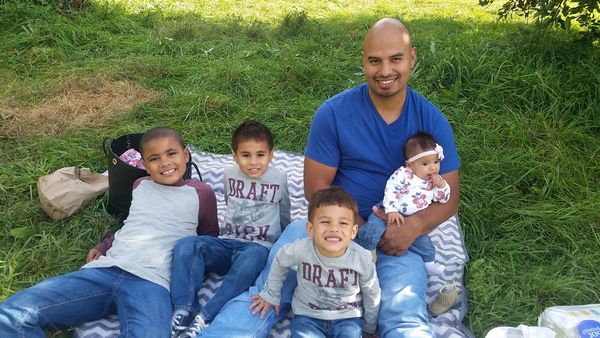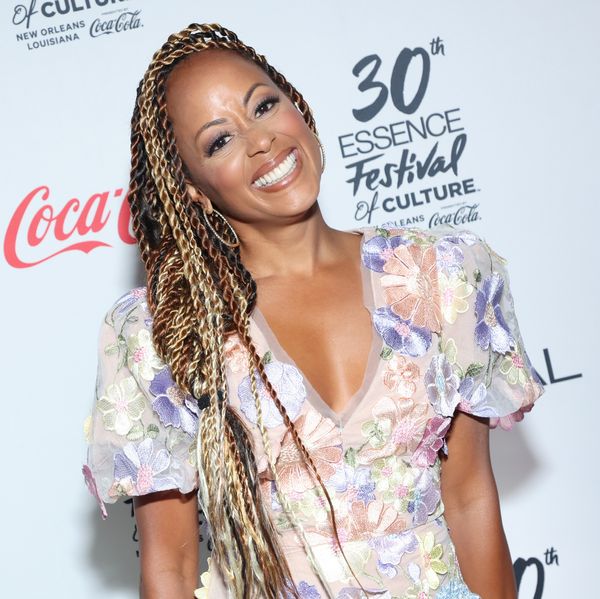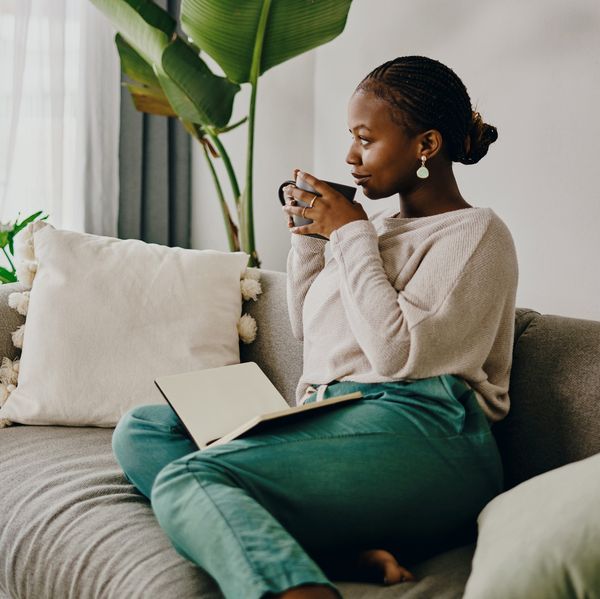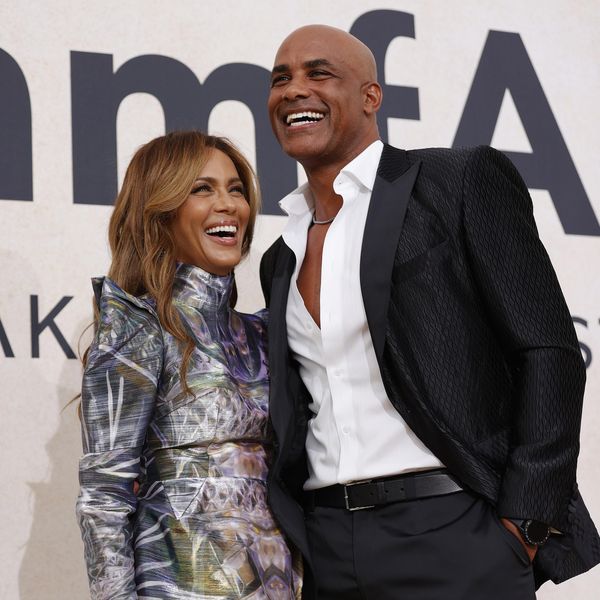The Best Gift: 5 Fathers Share How Seeing Their Children's Birth Changed Their View Of Life

It’s not often we see a grown man remove the "tough guy" stigma and shed a few tears.
Those moments are usually reserved for Super Bowl wins, award shows and maybe reality TV episodes, but we love when we get to see the softer side of a man that’s only revealed when a child comes into the world. But like anyone experiencing the not-so-pleasant joys of labor, any minute leading up to a baby’s arrival is one full of anxiety, excitement, and sometimes, a surprise or two.
As a mother, I can easily say that children do indeed change you for the better. I’ve loved the quote “A baby will make love stronger, days shorter, nights longer, bankroll smaller, a home happier, clothes shabbier, the past forgotten and the future worth living for” since joining the Mommy Club back in ‘09 because it’s pretty accurate, but I wanted to get the flip side and ask a few men what their thoughts were on fatherhood.
I was particularly interested in hearing how witnessing the arrival of their sons or daughters changed their perspective on life, so I picked the brain of five awesome fathers I know to get some answers. Check them out below.
Irving on the birth of his daughter, Sofia Catalina:

Birth is not a one-sided journey–you should always have a partner (husband, boyfriend, girlfriend, wife, family member), someone that will help you progress. The whole journey changed my relationship with Carol for the better and it also made us stronger as a couple. It made us love our daughter so much more. I think it changed a lot in me. I don’t just have to worry about me; I have to worry about my daughter. Any decision I make that can negatively affect her. I don’t go out as much and when I spend time with friends, I try and spend more time with friends who have kids because they understand what you’re going through. I’m so excited to be able to mold my daughter into something great and see what kind of person she will become.
Rob on being a father of the Fantasic Four:

Fatherhood is a great feeling, especially to four beautiful kids. I feel blessed to have come from a big family. I came from one myself, but I didn’t imagine I would have a big family of my own. My fiancé and I get the crazy looks when we tell people we have four children, but again, it’s the biggest blessing.
Big Tim on being a father to his junior, Little Tim:
In a word, “renewed” like I was being born. It switched my whole mindstate. It’s like I instantly went from being a man, to now me being a father, protector, overseer, and future planner. When my son took his first breath, everything changed. I can’t say it was overwhelming, because I was ready for it, because I had months to prepare to be a father.
When I held him, I felt an overabundance of joy, happiness, pride, and for the most part, relieved because he made it. No parent wants to feel that ever. (Note: xoJoy and Big Tim’s son was born footling breech and she went into cardiac arrest during a caesareansection.)
It was one of those times where my faith purely carried me through to the next hour.
JJ on life with his son, Ethan:
I was there the entire birth and I originally wanted to get my son everything the moment he was born. Within days, I got his footprints tattooed on my chest around my heart as a pledge to be the best dad I could be. I think the first year of his life going through court and having to fight made me realize that he was indeed special and I would fight for him every minute I can. I then became more spiritual and began pushing for a family atmosphere. Fatherhood has its challenges and changes as the child grows, especially when you and the mother are not together, however, each moment I spend with my son, our bond continuously develops and I am thankful for that.
The first relationship a child has is with his mother. Therefore to me, fatherhood is a supportive and firm role where you lead and also give support to the mother in the overall development of the child. I hope to give my son a life that wasn't given to me. Be there and be active regardless of the relationship between his mother and I. My biggest wish is to help him create his own legacy and support him along the way as he chases his dreams.
Robert, on our sons, Kae and Kam: 
I was anxious to become a father. I come from a large family, so I was ready to add to that with my own children. I wasn’t afraid to see my sons come into the world, but I was actually scared for you because I didn’t know what could happen.
There’s a love you have for your child the minute you hear “I'm pregnant,” but that love hits a high when you see the birth of that baby and even then, it’s a feeling that has no limits. It changed my outlook on the world and it was seeing them come into the world, that brought me joy and peace. They were a light and I have clarity on life because of them. I make better decisions and I'm a better man because of my boys.
If these stories don't have you in your feels, my favorite celebrity story would have to be from Iman Shumpert, who by the way has been over the moon and back since his junior, Iman Tayla Shumpert Jr has come into the world.
Junie’s (TT and Iman’s nickname for their little one) unexpected birth, coming one month earlier than anticipated, and Shumpert’s frantic and very emotional 911 phone call is proof of how frightening, but beautiful, the experience can be, especially if you aren’t even in the hospital!
Calling that moment in their home “an assist [he’s] never going to forget,” Shumpert told the story of how Teyana was going into labor in their bathroom; calling his daughter the best Christmas present he’s ever received.
Iman: “She’s telling me, ‘I’m not going to make it to the hospital,’ but I’m like, ‘You got to make it to the hospital because I don’t know what’s going on. I don’t know what to do.’ It was just time for her to come, so we counted to 10 and she did her [mimics breathing exercises]. She pushed and the head came out.”Teyana: “He’s way too calm.”
Iman: “I wasn’t that calm. It was like finishing a long marathon. [Cries] And Junie was right there.”
Teyana: “She was ready to show us what love really, really, really looks like.”
And after playing his part as Superhero Dad and Supportive Fiancé, it’s easy to see why. Shumpert is the real MVP!
Do you know a man who did a 180 on his life once becoming a dad? Shout ‘em out, show them some love, and tell us why in the comment section below!
Exclusive: Melanie Fiona On Making High-Vibrational Music & Saying Yes To Partnership
Melanie Fiona is back! After taking a little more than a decade-long hiatus, she has officially made her return to music and blessed us with two singles, “Say Yes” and “I Choose You.” While both singles are very different from each other, they both reflect who she is today and the type of music she wants to make. In our conversation, the mom of two expressed what she learned during her time away.
“It's interesting, even when I said it is like coming back, I don't ever feel like I really left because I was always still performing. I've still been public. It's not like I went into being this recluse person or version of myself, but the thing that I really learned in this process is that I think things take time,” Melanie says in a xoNecole exclusive.
“I think often we're so caught up in it, being on the timing of demand or popularity, or, like, striking while the iron is hot and the thing that I've learned is that everything is on God's time. That's it. Every time I thought I would have been ready, or, like, things were taking too long, I had to reship some things, personally, professionally, in my life. I also gave myself permission to make a living, not just make a living, but make a life for myself.”
Making a life for herself included getting married to Grammy-nominated songwriter Jared Cotter, starting a family, and embracing new landscapes, such as podcasting as a co-host of The Mama’s Den podcast. She also began doing more spiritual work and self-care practices like meditation, sound healing, Reiki, acupuncture, and boundary setting, which allowed her to get in touch with her inner voice.
“I wasn't putting out music, and I wasn't experiencing a number one record, but I was being a number one mom,” she says.
“I was experiencing things that were allowing me to heal and get in touch with myself so that I could make new music from a space of joy and freedom, and excitement again because I definitely feel like I did lose some excitement because of just politics and industry and what it can do to your mental health and even your physical health. So giving myself the space to really just say, ‘Hey, it's okay. Everything's right on time.’”
The joy and excitement are felt in one of two new singles, “I Choose You,” which is more of a lovers rock vibe, a tribute to Melanie’s Caribbean roots. While the Grammy award-winner is known for ballads like “It Kills Me” and “Fool For You,” she is becoming more intentional about the music she makes, calling it high-vibrational music. She says her music is a “reflection of my life,” as it captures every facet, from hanging out with friends to riding around in her car.
“Say Yes” has the classic R&B vibe Melanie is known for. However, both songs are inspired by her relationship. Melanie and Jared got married in December 2020, and the Toronto-bred artist dished on their relationship. Fun fact: he is featured in the “Say Yes” music video.
“When we first started dating, I had come into that relationship post a lot of self-work. I had gotten out of a long-term relationship, I had a year and a half to date and be by myself and do a lot of work on myself alone. And when we met, I remember feeling like this has to be my person because I feel it,” she says.
“And so when we went into that relationship, and we started dating, I was very clear. I was like, I know what I want. I'm very clear on what I need, and I'm not going to withhold my truth about myself in this process because of pride or fear of rejection. I know you love me, but I'm coming with my heart in my hand to let you know that if we're gonna get there, we have to put fear aside and say yes. So that was kind of like my open letter to him, which is why the video is us having a conversation.”
Melanie also shares that saying yes to her partner has empowered her in many ways, including motherhood and showing up for herself. Her new EP, also titled Say Yes, will be available at the top of 2025.
Check out the full interview below.
Let’s make things inbox official! Sign up for the xoNecole newsletter for love, wellness, career, and exclusive content delivered straight to your inbox.
Feature image by Franco Zulueta
You'd Be Amazed How Much These 10 Essential Oils Can Give You Some Blissful Sleep
If you’re someone who has a sleep routine (or you’re seriously thinking about creating one), please make sure that you incorporate scent into it. Although things like a cooler temperature in your bedroom, incorporating nature sounds (like rain or ocean waves via a sound machine or even a YouTube channel) and even sipping on some tart cherry juice are proven ways to get you the quality of rest that you’re after, science says that your sense of smell shouldn’t be overlooked.
In fact, aromatherapy is quite powerful when it comes to promoting calm and relaxation, helping to put you into an optimistic mood, reducing stress, preventing insomnia, and improving how soundly you are able to sleep throughout the night. And so, since I’m such an essential oils fan (and I truly am!), let’s get into 10 that will help you to rest well — thanks to the way that they smell along with a few other benefits that they are able to offer you too.
Essential Oils for Better Sleep

Getty Images
1. Lavender
When it comes to essential oils that are best for you in the “rest and relaxation department,” lavender may be the most popular one. That’s because it is well known for doing everything from reducing pain and inflammation and making menstrual cramps less intense to lowering anxiety and increasing your melatonin levels. On a super scientific note, something else that’s cool about lavender oil is it works with your body’s neurotransmitters in order to reduce restlessness if you happen to be someone who doesn’t sleep soundly due to tossing and turning all throughout the night.
2. Cedarwood
Although I’ve always liked the earthy scent of cedarwood, something that caused it to earn my respect was reading about how it’s an all-natural way to improve the attention span of children who’ve been diagnosed with autism and ADHD. Beyond that, as far as calming oneself goes, cedarwood oil is able to soothe arthritic discomfort, reduce coughing (if a cold is what’s keeping you up), decrease the itchiness and irritation that comes with eczema, lower your stress levels, and, yes, improve your quality of sleep if you’re someone who happens to rest yet not really…rest well.

Unsplash
3. Patchouli
Another oil that has a solid reputation for decreasing bodily inflammation is patchouli. Some other things that make it stellar are the facts that it helps to ward off depression-related symptoms (if that is what keeps you up at night), puts you in a better mood, boosts your immunity (so that being under the weather doesn’t prevent you from catching some zzz’s) and it even intensifies your libido — ‘cause chile, ain’t nothin’ like the sleep that you get after having an orgasm…or two. Oh, and it absolutely must go on record that patchouli oil also acts as a sedative if you’ve been dealing with insomnia as of late as well.
4. Marjoram
Women who are looking for an all-natural way to regulate their hormones (check out “5 Signs Your Estrogen Is Too High. 5 Signs It's Too Low.”) might want to speak with their doctor (or homeopath) about trying marjoram oil. Some research says that it can help to balance hormones which can make PMS and the latter stages of perimenopause more tolerable (which can make falling and staying asleep easier to do too). Marjoram is also helpful when it comes to reducing pain, easing digestion, and alleviating anxiety.
Plus, since marjoram is an oil that is high in magnesium and magnesium is a nutrient that can help you to get to sleep, stay asleep, and then wake up feeling refreshed — so long as you’re not pregnant or breastfeeding (you should consult your doctor first if you are because it can sometimes produce side effects in your case), you definitely should give marjoram a shot.

Getty Images
5. Ylang Ylang
Typically, when I think of the essential oil ylang ylang, what comes to my mind is how it can make for a very eventful evening…if you catch my drift (check out “Ultimate Climax Hack? 10 Scents That Make It So Much Easier To Orgasm”); however, it can actually help you out in more areas of your life than just your bedroom. Ylang ylang is another oil that helps to reduce pain and anxiety. Something else to keep in mind about ylang ylang is if you’re having a hard time falling asleep due to something like a headache or even respiratory issues, putting a couple of drops into a diffuser could bring some relief. That’s because ylang ylang is also classified as being a sedative — one that can even help to lower the blood pressure in your bae (healthy men) if need be.
6. Fennel
As a doula, something that I’m well aware of is the fact that fennel seeds can help (some) mothers to produce more breast milk. It doesn’t stop there, though. If sleep is evading you due to gas or constipation, fennel oil can help you out there. Some scientific research also says that it’s the kind of oil that can help you feel less anxious if you’re trying to rest after a long hard day. And, since fennel is known for making sleeping better when it’s in tea form, I don’t see why it wouldn’t do the same thing as an essential oil too.

Unsplash
7. Valerian Root
If you’re looking for the kind of essential oil that will help you to relax, on pretty much every level, look no further than valerian root. The properties in it are going to help to calm your nervous system, soothe headache tension, lower your stress levels, decrease menstrual cramp discomfort, bring relief to hot flashes (that come with perimenopause) and yes, it’s an all-natural approach to insomnia as well. Although many choose to use it in supplement form, applying valerian root oil to pressure points like your feet can also provide a very relaxing and impactful effect.
8. Jasmine
If you check out my article, “8 Natural Aphrodisiac Scents, Where They Go & How To Make Them Last” from back in the day, you’ll see that jasmine is another essential oil that is considered to be a pretty potential one if you’re looking to boost you (or your partner’s libido). I get why too because its floral-meets-fruity scent can be quite sensual. Beyond the bedroom, jasmine can help you to feel less stressed and anxious, experience less menstrual-related discomfort, and make you feel less depressed — and yes, it contains properties that qualify the oil to be a sedative. This is especially the case if you blend it with another soothing essential oil like lavender.

9. Clary Sage
If pretty much nothing but perimenopause symptoms are what’s keeping you awake at night, you might want to keep a bottle of clary sage oil on your nightstand because it can help to decrease night sweats by naturally “leveling out” the estrogen that may be on a bit of a roller coaster ride in your system right through here. Other things that this oil can do is reduce stress and help to relax your system. Not to mention the fact that if menstrual cramps are what’s keeping you up, some women say that rubbing some of the oil (add a carrier oil like sweet almond or avocado to the oil to dilute it a bit, please) to your abdominal region can provide quite a bit of relief.
10. Vetiver
Final one. In my opinion, it’s kind of surprising that vetiver essential oil isn’t mentioned more in the holistic care space. For starters, it has been celebrated for providing support for children with ADHD as well as decreasing nervousness and anxiety in adults. Some other ways that this oil can benefit you is it’s the kind of aphrodisiac that raises testosterone levels while lowering cortisol ones (cortisol is a stress hormone that’s in your body) which can intensify orgasms and promote great rest — and yes, it’s also mentioned quite often in the sleep-inducing space.
___
You know, I once read that since 2010, the amount of people who rely on sleeping pills to get to sleep has pretty much doubled. Since the side effects of the long-term use of over-the-counter sedatives include things like headaches, muscle weakness, digestion issues, and even louder snoring and sleeplessness, consider trying one of these essential oils before popping a pill. As you can see, not only can certain oils help to lull you to sleep — but they can help in so many other areas too. Happy resting, chile.
Let’s make things inbox official! Sign up for the xoNecole newsletter for love, wellness, career, and exclusive content delivered straight to your inbox.
Featured image by Mavocado/Getty Images








